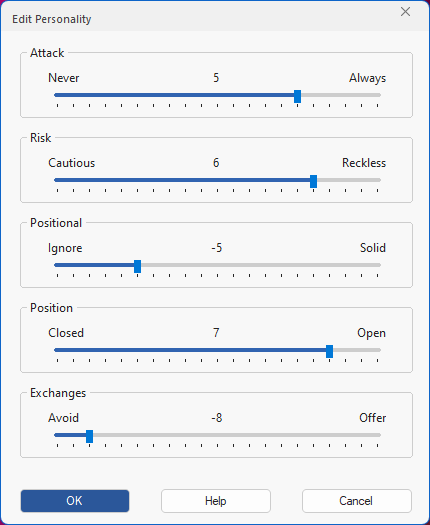
Configuring an attacking player.
Configure Your Easy Game Opponent’s Style
In Easy Game mode, you can fine-tune your opponent's playing style using five parameters that influence move selection. The program may deliberately choose suboptimal moves if they align with the defined style and do not result in serious blunders.
Style Parameters
-
Attack
Controls the tendency to play attacking moves. High values increase the likelihood of sacrifices and aggressive actions aimed at the enemy king. -
Risk
Defines the willingness to enter sharp or unclear positions. Higher risk increases the chance of speculative or double-edged play, including unsound sacrifices. -
Positional
Influences the probability of playing moves that follow positional principles—good pawn structure, harmonious piece coordination, central control, queenside play, space, development, and passed pawns. -
Position Type
Sets the tendency toward open or closed positions. Higher values may favor blocked pawn structures or seek to avoid them, depending on the context. -
Exchanges
Determines the likelihood of accepting, offering, or avoiding exchanges. A higher value increases simplification and trade tendencies.
Tip: How to Apply Values from the ChessBase Style Report
The ChessBase Style Report analyzes player tendencies based on hundreds of games. While the Fritz opponent style directly affects move selection (unlike the statistical report), you can approximate a player's behavior quite well using the report's metrics:
-
Attack, Risk, and Positional from the Style Report map directly to the corresponding parameters above.
-
Position Type is a sub-aspect of the Style Report but plays a more explicit role in Fritz. Use it to simulate a player’s preference for open or closed positions.
-
Endgame Strength from the Style Report cannot be directly applied to individual move choices. Instead, reflect it through the Exchanges parameter. For example, a player like Magnus Carlsen, known for exceptional endgame skills, would have a higher exchange probability—leading to earlier simplification and more frequent entry into endgame scenarios.